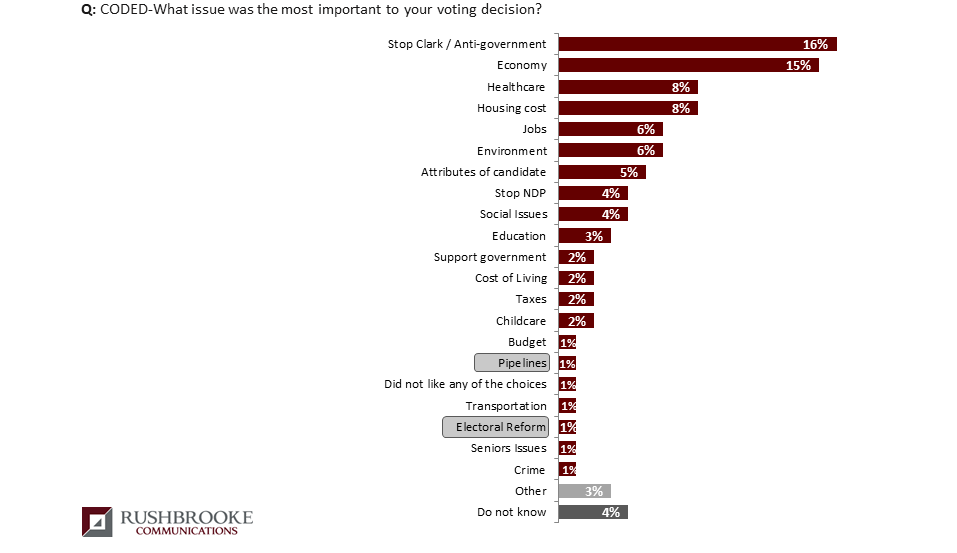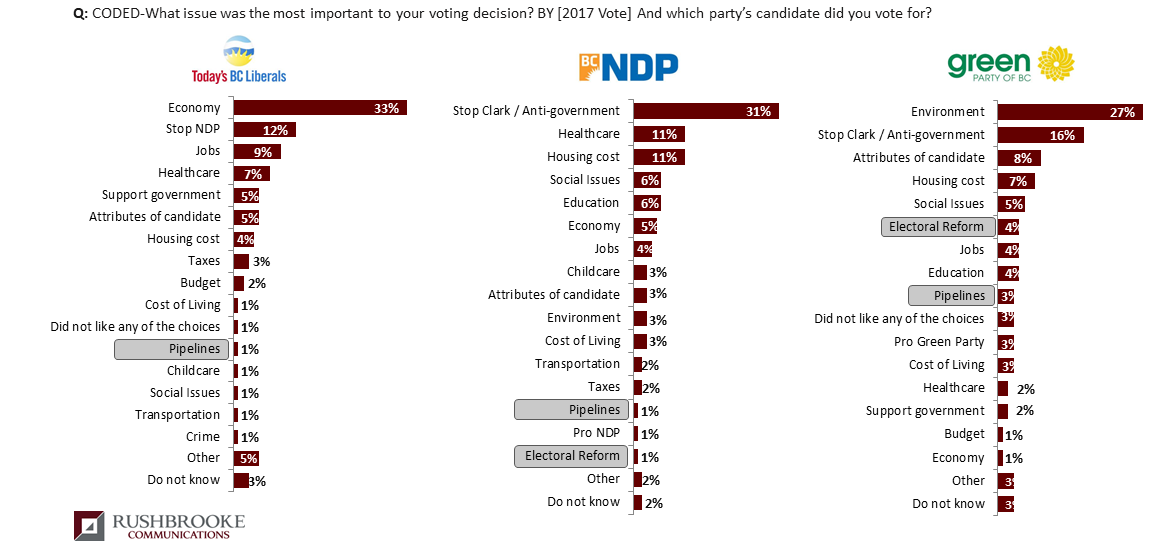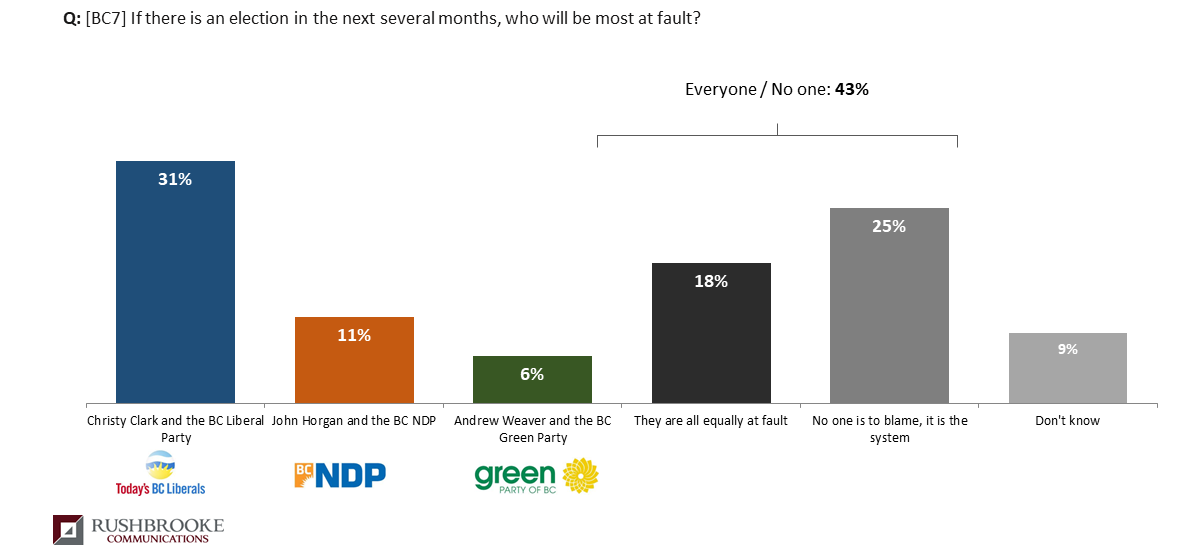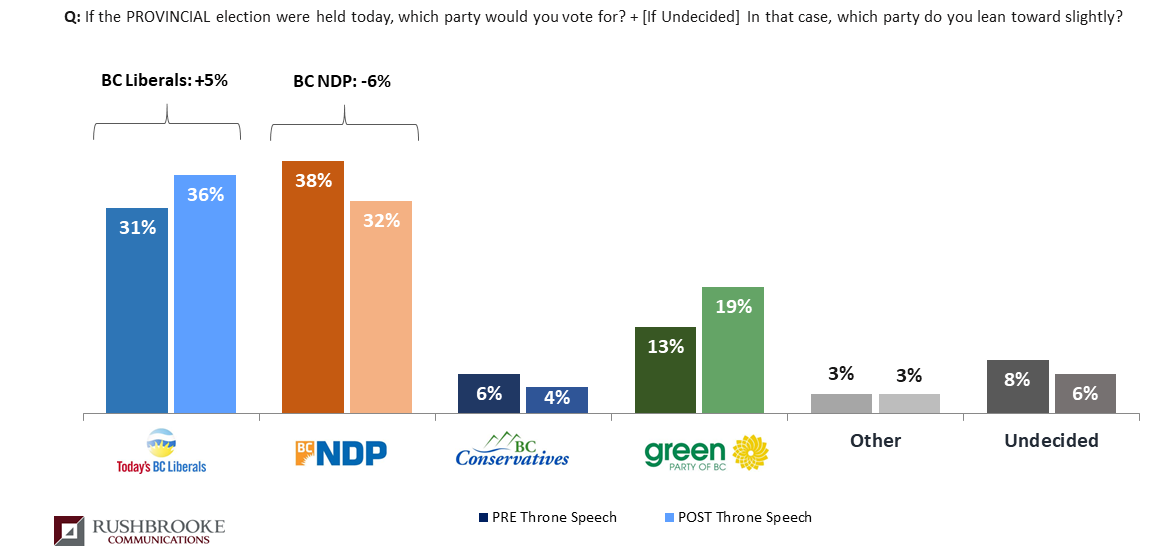Revisiting the 2017 BC election
The 2017 British Columbia provincial election saw the BC Liberals lose government to an NDP minority propped up by an awkward coalition with the Greens. The preceding drama included a controversial throne speech and Hail Mary attempt to force an election. To make sense of it all, I revisited a dataset from the end of June 2017. As luck would have it, I was already in the field as the political drama peaked. Here are a few things I learned:
1. The ‘big’ issues, were not.
Consider the importance, or lack of, that voters assigned to the following issues:
- BC Hydro Site C project;
- LNG development;
- Political donation rules;
- Union certification process; and,
- Electoral reform.

Many of the issues that consumed the press gallery and sent partisans into a frenzy got little more than a shrug from voters. Even those ‘key’ issues that do appear, garnered sparse attention. To be clear, these issues may have been symbolic of concerns among voters, but they were not game-changers in of themselves.
2. It was a murky mandate.
The post-election ‘mandate math’ never added up (60% of BCer voted for parties that support policy X / oppose policy Y.) As a communicator, I can appreciate the talking point “logic”. But as a pollster, it is some pretty thin gruel.

The top two issues among voters in each party (time for change / stop the NDP) represented a referendum on the government. Predictably, they divide along partisan lines. There was also a partisan divide to the prioritization of economic vs. environmental/other issues. But again, regardless of party vote, the purported ‘big’ issues fail to appear as significant priorities.
.
3. Forcing an ‘unnecessary’ election posed little political risk
The numbers are less than ideal for a “Whose fault is it?” ballot question. As a PMO staffer during Prime Minister Martin’s minority government, I spent a good part of 2005 warning of the doom that would befall anyone foolish enough to bring down the government: “It is a waste of taxpayers money!” “Voters will punish the party….” etc.
Despite having spouted all of the lines, I have never been a fan of the “unnecessary election” narrative. In my experience offering a voice in any decision is typically well-received—even by those that don’t participate.
Yes, Premier Christy Clark received the most blame with 31%. But, a larger plurality of voters—the 43% that say it is everyone or the system’s fault—do not buy the premise. The blame game was a strategy to get 30% in a game where over 40% is needed to win.
4. That terrible BC Liberal throne ‘clone’ speech was a political winner.
The BC Liberal throne speech included a heavy dose of policy goodies and promises lifted from the BC NDP and Green campaign platforms. Pundits went apoplectic derisively dubbing it the ‘clone’ speech. This was followed by relentless pontification on the existential threat the throne speech posed to the BC Liberal brand and the enormity of the party’s impending electoral doom.
While the election never came, we can imagine what might have been by comparing the data collected before and after the throne speech. The BC Liberals benefited from an 11 point swing in the horse race against the NDP.
Voters do not punish those who give them what they want! In hindsight, the big swing in vote towards the BC Liberals immediately after the throne speech shouldn’t be that surprising. British Columbians want what they want. Lower tolls? Yes, please. Less expensive childcare? Yes, I’ll take that too. British Columbians frustrated with the cost of living were looking for relief, and unlike die-hard partisans and pundits, they couldn’t give a damn about who it came from.
5. Looking ahead
If there’s is a lesson in all of this, it is a cautionary tale about being too ideological. In the end, purity tests and partisan principles are much more important to party stalwarts than they are to the attention-limited self-interested voters that will decide the election.






